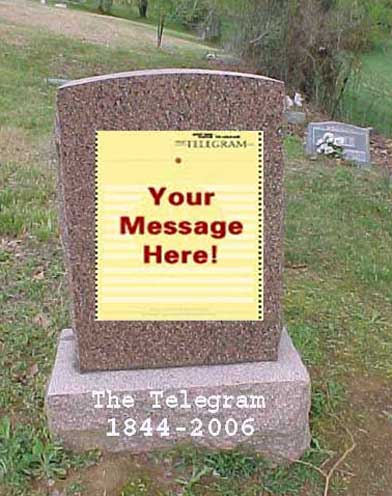R.I.P: The Telegram, The First Internet


With little fanfare and with even less concern, Western Union delivered its last-ever telegram on Friday, January 27.
Although I usually use this space to write about converging and emerging broadband communications technologies, this is a good place and time for a eulogy.
Long before there was an Internet, email, or even phones, there was the telegraph, and telegrams.
One might say that the telegram, and the telegraphs they were sent over, constituted the world's first mechanized, real-time communications infrastructure.
On May, 24, 1844 the first telegram ever was sent by Samuel L. Morse. Sent from Washington to Baltimore, the message read, "what hath God wrought."
Over the next few decades, telegraphs invented by Morse and his assistant, Alfred Vail, where deployed around the nation and around the world. The first Transatlantic Telegraph cable was succesfully completed on July 27, 1866.
In 1892, Thomas Edison was awarded a patent for the first two-way telegraph.
Fast forward through the next century. Telegrams were the primary means of non-verbal, instant communications across distances. Newspapers were named "telegram" and "telegraph." Foreign correspondents described the ravages of battle. Students off at college wired their parents with news of their safe arrival. Invitations were delivered, deals were struck, people fell in and out of love. Geographically distant cousins sent their best wishes to wedding parties they could not attend.
Telegrams were always faster than letters.
Then, long-distance phone calls got cheaper. In what has to be the peak of irony, these calls became less expensive because of the breakup of a company with an initial that stood for "telegraph." I am talking about AT&T, which in an incarnation that stood firm for most of the 20th century, had the formal corporate name of American Telephone & Telegraph.
Yet on January 27, the first Internet fell silent forever. Apparently there are still a couple of companies that will send telegrams as special promotions, but none that provide a regular telegram service such as Western Union did.
Sad, in a way, that although we know who sent the first telegram and what message it contained, we have no knowledge of who sent the last telegram ever, and the words therein.
I have an original saying that I think applies here.
Obscurity is the ultimate destiny of sustained irrelevance.
But rather than consign the telegram to the dustbin of history, let us remember telegrams and how they impacted our lives. For this example, I cite the lyrics to "Western Union," the 1966 classic hit by The Five Americans:
Things went wrong today
Bad news came my way
I woke up to find
A wire that blew my mind
Western Union man
Bad news in his hand
Knocking at my door
Selling me the score
Fifteen cents a word to read
A telegram I didn't need
Said she didn't care no more
Think I'll throw it on the floor
Got your cable just today
Killed my groove, I've got to say, hey
(...hey) Western Union
Da-da-da-da-da da-da-da-da-da
Da-da-da-da-da da-da-da-da-da
Da-da-da-da-da da-da-da-da-da
Da-da-da-da-da da-da-da-da-da
Now you've gone away and
How it's sad to say you've gone
I remember what they said
Now I'm going out of my head
Telegram just had to say
You've learned your lesson all the way, hey
I'll be on my way 'cause
There's another girl for me
I'll be sure of her and
Things'll be as they were
Da-da-da-da-da da-da-da-da-da
(Western Union, oh Western Union)
Oh, Western Union, indeed.